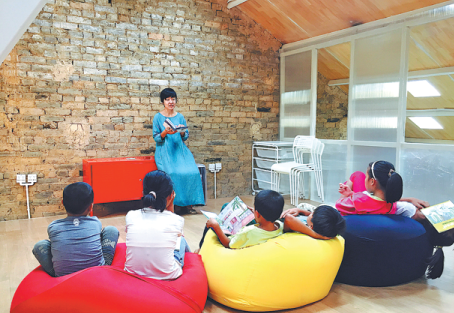
The first time Huang Juan arrived at Sanjia village, in the Guangxi Zhuang autonomous region, her goal was to demolish decrepit buildings and homes, rather than preserve them.
She was working on a tourism development program to boost incomes by improving living conditions and rural tourism.
Just less than 100 km from Nanning, the region’s capital, the village is located in Mashan county surrounded by looming karst mountains.
Most of the villagers had moved into their new houses with the help of the government in 2014 when a reconstruction program was launched to promote rural tourism.
“How could people make a sustainable future out of a place with little tourism resources like Sanjia”, said Huang, “I began to wonder whether there is a way to inspire the villagers to be more involved to attract visitors”.
South yard is a house she decided to renovate. Its cob brick structure was built more than 60 years ago.
“When there are very few old dwellings left, I began to realize the villagers may lose their past and how urgent it is to save the authentic heart of the place,” said Huang.
She wanted to restore it as a public space for the villagers and a platform to exchange ideas and introduce resources, or even use it as a place of retreat and contemplation.
Mu Wei, an architect who designed the Norwegian pavilion for the Shanghai Expo, joined her and undertook the design.
The building was designed in two sections, the former main building and a new light house, which stand together in harmony by the river.
The main building, which presents the past, was renovated in its original style with a tilt roof.
The light house is characterized with large area of French casement and a wood framework which makes the space transparent and bright.
Nearby villagers offered their help in the renovation although they didn’t understand her concept at first.
South yard was completed in September 2016, after a year’s hard work, at a cost of 1.3 million yuan ($190,000).
Contributing to the unique design, the refreshing building has been officially selected as one of the 50 habitats for the UN urban think programs, an essential part of the World Urban Campaign, which is trying to better shape the future of urban space.
Villagers and children like to spend time here, and consider the past and the future.
Equipped with books, South yard soon became a popular haunt for “left-behind” children, whose parents went to the city to find work.
“I want to bring an aesthetic education into the countryside, I believe that as long as our kids are led to find the beauty of the nature, they will find the way to love life,” said Huang.
Huang loves telling stories to the children and encourages them to explore different kinds of knowledge.
Apart from the education, South yard also works as a platform to attract resources from outside and offers hotel management training to villagers.
“My real purpose is to unite the villagers and lead them to find the way to run their business and bring vitality to the village,” she said.
Right now she is trying to establish a tourism society run by farmers so that more villagers could stay at home and make a living.
To make the village more attractive, she is planning an international arts festival which would invite foreign artist to do creations together with the villagers and visitors.
A new home, made from the past, inspires a vision of the future.


